The easy way to systemize how your business works

Have your team handle complex tasks
consistently and without your support
It's easy to delegate even the most complex tasks using guided checklists.
Free up your time, so you can focus 100% on growing your business.
Delegate effectively
We'll show you how to create, test and hand over a guided checklist in under an hour.
Integrate and automate
Integrate your checklists with Hubspot, GitHub, Slack and 5000+ other apps (via Zapier).
Continuously improve
Once documented, it's easy to manage, update and continuously improve your checklists.
Get new employees productive in <5 days
and with just 2 hours of manager time
time by 80%, “wow” your new joiners, and save 100s of hours supporting each one.
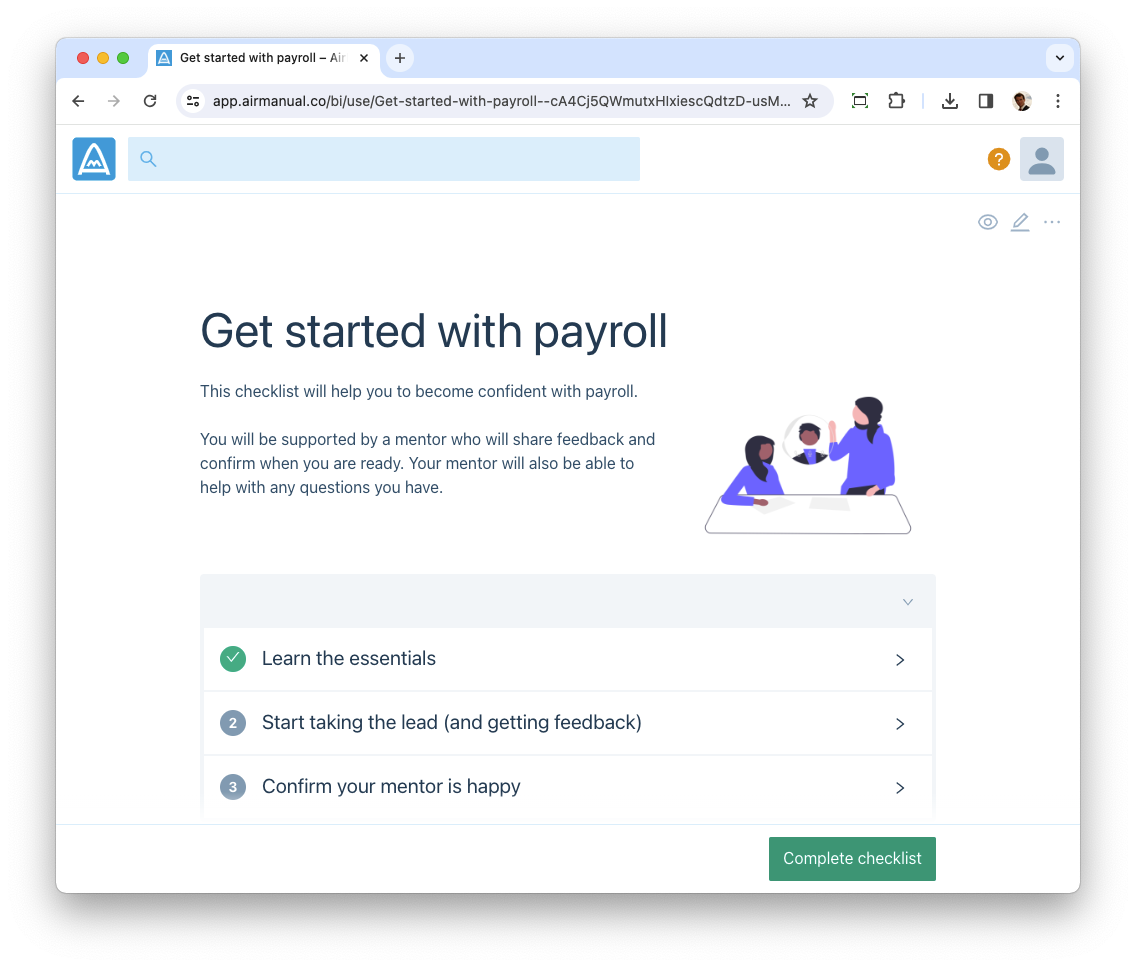
Organize, manage and scale up
effective operations for every team
Marketing
The podcast got consistent when we delegated 3 hours of weekly tasks.
Learn more

Sales
Our junior sales reps now outperform our founders by 12%.
Learn more

Customer success
We make sure every customer has the same amazing experiencing.
Learn more
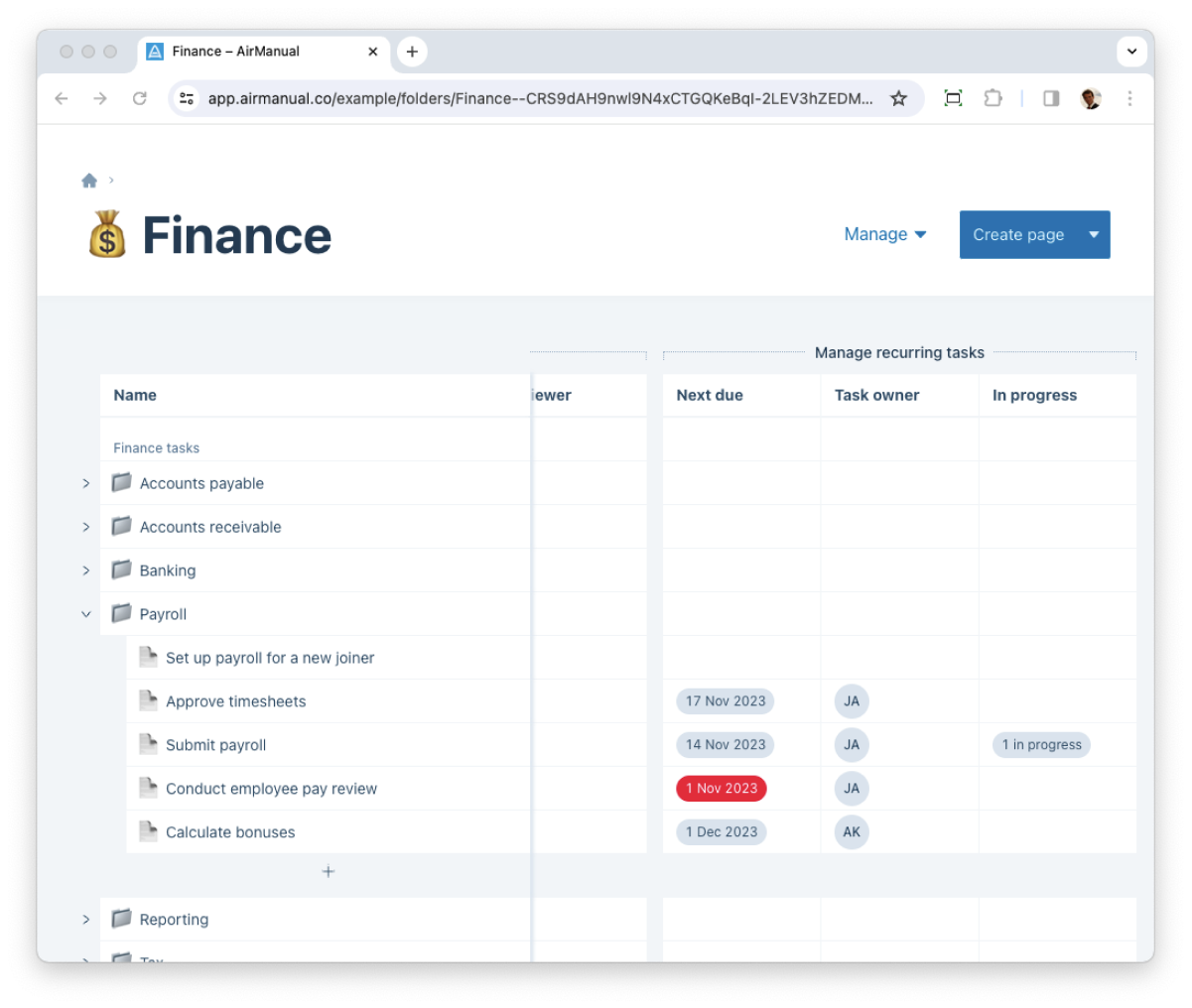
Every team
In AirManual, you can give every team the tools they need to plan, prioritize and manage their own team manuals.
Included: Playbooks to provide the rocket-fuel for your SaaS
We’ve created templates and guidance worth $30,000+ to help you tackle the biggest challenges in
scaling a SaaS. Here’s just a taster of the value you can expect — it’s all available online, for FREE.
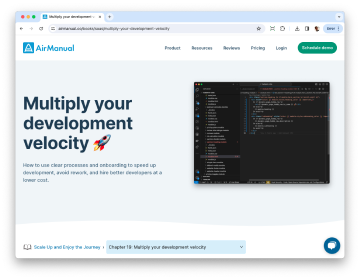
Sales and marketing playbook
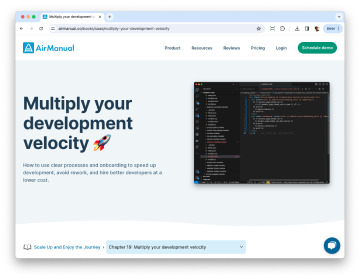
Development team playbook
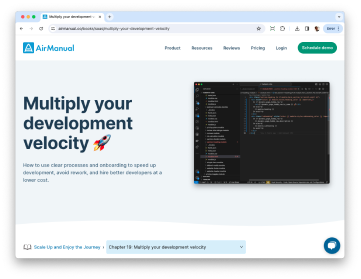
Recruitment playbook
Stop holding the business back
A lack of guidance doesn't just cause stress — it's hitting your bottom line.
Free up 100s of hours
Leaders too busy? Then start here.Stop costly mistakes
Onboard 5x faster
Stop relying on people
Don't lose months when someone gets sick or leaves the company.Cut hiring costs in half
Business value: +20%
Repeat what works
Systemize your best practices and get consistent results.Continuously improve
Make small improvements every week and watch it compound.
Unlock growth
Put it all together and take your business to the next level.
Ready to scale an amazing business?
Talk to an expert
Join us on a demo and planning call to review your challenges and plan the best place to start.
We’ll prioritize the areas where you can expect a 10–100x return on your investment of both time and money.
This call is with an expert consultant, and there's zero cost or commitment.
Hand over your first task
In just 1 hour, you’ll be able to document and hand over your first task.
This will be a task that’s currently draining your energy, taking your time, and holding the business back. You can expect to see a return on your time investment within weeks, and some business owners immediately join the 15 hour club having freed up an epic 15 hours per week.
Help every team to deliver amazing results, without you
We’ll show you how to take an agile approach, starting with one team and then rolling it out to others.
Each week, you’ll review your challenges and prioritize where to improve your processes. Over time, you’ll systemize an incredibly client experience, build a sales and marketing machine, and get to the point that every team is delivering amazing results, without your support.
Join hundreds of happy customers
Don’t wait until you “have more time”
We can help you solve this in hours. Scale faster and enjoy the journey.
Still got questions?
learn a whole new skill for your business!
Will this work for a business of our size?
The AirManual approach and platform works wells in any organization in which tasks can be delegated from one person to another.
Essentially, this is any organization with more than 2 or 3 people in it.
We work with a mix of:
- Small startups with 2–25 employees
- Scaling startups with 26–250 employees
- Larger enterprises (inc. FTSE 500/Fortune 500 companies)
The sooner you start, the better — you'll learn how to avoid a ton of stress and start scaling faster today. Experienced second and third time founders will get on top of this as soon as they start scaling.
How much time will this take me?
Most founders overestimate how long this will take, and underestimate the impact it will have.
To get started:
- It takes 30 seconds to schedule your demo and planning call
- It takes 45 minutes to have the demo and create your plan
- It takes 1 hour to hand over your first task (which should free up multiple hours every week!)
Ongoing, we recommend an agile approach.
Each week, you’ll review your challenges and prioritize where to improve your processes. Over time, you’ll create a sales and marketing machine, multiply your development velocity, and get to the point that every team is delivering amazing results, without your support.
We're working on other projects — is now really the right time?
The old way of systemizing was a "waterfall" approach where you'd list out all your processes and start documenting.
This isn't a great idea for most businesses — it will hold you back from other projects that could have a bigger impact.
A much better approach is to take an "agile" approach to systemizing. We can help you look at your current projects and help you identify where better guidance and processes will help you move faster.
A common way to do this is to identify the tasks that are eating up the time of people working on the project. AirManual will help you to get these delegated, freeing up a ton of time for your best people.
How much will this cost?
You can review our pricing here.
You'll see we offer:
- Incredibly affordable monthly/annual packages (given the impact)
- Personalized workshops to help your team start documenting and implementing processes effectively.
If you have any questions, you can reach out to us via the chat (in the bottom right of your screen) or sales@airmanual.co.
What return on investment (ROI) can I expect?
If you do this right, you'll see a huge return on investment on both the time and money you invest.
AirManual gives you a way of taking any best practice you read about, and systemizing it in your organization.
Being agile, you can make hundreds of improvements each year, and these improvements all compound upon each other.
The impact might include:
- Free up 15+ hours of founder time (each week!): $10,000s–$100,000s
- Help teams avoid costly mistakes and rework: $10,000–$100,000s
- Save 100s of hours in training and onboarding, cut hiring costs and reduce employee churn: $10,000–$100,000s
- Stop the business stalling when specific people aren't available: $10,000s–$100,000s
- Add 20% to the value of your business when you sell: $1,000,000s
In the short-term, we'll be looking for at least a 10x ROI.
My business is changing fast — should I wait until it's in a more steady state?
When your business is rapidly growing and frequently changing, it can be tempting to say “we’re not ready for this yet”.
But, here’s the thing: there will be some tasks that your team are doing repeatedly. Perhaps it’s sales calls, or developing new features, or sending quotes.
You want to get these tasks systemized, so that:
- Other members of the team can take these tasks off your plate
- You can see how the tasks are currently done, and make improvements
- You can permanently fix mistakes when they happen (by updating the process)
- The business isn’t reliant on specific team members
- You can free up your own time for other projects
That said — if you don't yet have anyone else to delegate to (i.e. you're just a couple of founders), then you might want to wait.
Whereas if you already have a small team, then the sooner you start systemizing what works, the easier scaling will be.
Should I wait until I've hired the people I need first?
It's a good idea to start systemizing BEFORE you hire.
This will help you get clear on:
- What their responsibilities will be
- What skills they need to bring vs. what will learn through your processes and onboarding
- How you will onboard them
The impact of doing this can be huge:
- You'll do a better job of advertising the role and recruiting
- You may be able to hire candidates with less experience than you imagined (increasing the pool, the likelihood of a strong culture-fit, and saving you 20–50% in costs)
- You'll be ready to onboard and get them productive in just 1 week
What happens if my team don't follow the processes?
You need to hold your team accountable for following processes, and suggesting improvements when needed.
This is essential for scaling — if you can't agree on how to do things, you'll be operating at a fraction of your potential. You'll always be relying on specific people to get results, and dealing with same mistakes.
Fortunately, AirManual makes this easy. The platform includes management tools so you can see:
- When recurring processes should happen
- Who's responsible
- The current state of any checklist
- If any processes haven't happened for any reason
It takes < 5 minutes to review this each week, which we recommend incorporating into your team meetings.
How will this help my Sales team?
A typical manual for a Sales team would include:
- Guided checklists for recurring tasks, e.g. Make sales calls, Run a discovery call, Share a quote, Run the Sales weekly meeting
- Self-service training, e.g. Learn how to run discovery calls, Learn how to handle objections
- Self-service onboarding, e.g. Get started in the Sales team, Get started with inbound sales
- A dashboard for planning guidance and managing recurring processes
- Integrations with your CRM and other tools your sales team use (e.g. after a demo call, we automatically update our CRM, send out call satisfaction surveys, share an update with the team in Slack, and more!)
This will help your Sales team to:
- Deliver a consistent experience for leads
- Optimize the sales process
- Start blaming the process (rather than people) when issues occur
- Permanently fix issues to prevent them reoccurring
- Hire junior team members with the right skills and culture fit (rather than feeling that you always need senior hires)
- Get new joiners up to speed quickly
- Help existing team members to take on new responsibilities
- Remove your reliance on specific team members
This will help your bottom line by:
- Increasing conversion rates
- Increasing customer retention
- Reducing costs
- Reducing employee churn
- Freeing up leadership time for other opportunities
And it will help you — and the team — to enjoy the journey!
How will this help my Marketing team?
A typical manual for a Marketing team would include:
- Guided checklists for recurring tasks, e.g. Publish and promote a podcast, Prepare social media posts, Prepare for an event, Run the Marketing weekly meeting
- Self-service training, e.g. Learn how to write great copy, Learn how to promote and protect our brand
- Self-service onboarding, e.g. Get started in the Marketing team, Get started with automated workflows
- A dashboard for planning guidance and managing recurring processes
- Integrations with your CRM and other tools your marketing team use (e.g. when we publish a podcast, we include steps to use a number of other tools to improve the recording)
This will help your Marketing team to:
- Get consistent at delivering high quality content
- Optimize the process for creating content
- Free up time for running more experiments
- Start blaming the process (rather than people) when issues occur
- Permanently fix issues to prevent them reoccurring
- Hire junior team members with the right skills and culture fit (rather than feeling that you always need senior hires)
- Get new joiners up to speed quickly
- Help existing team members to take on new responsibilities
- Remove your reliance on specific team members
This will help your bottom line by:
- Increasing conversion rates
- Increasing customer retention
- Reducing costs
- Reducing employee churn
- Freeing up leadership time for other opportunities
And it will help you — and the team — to enjoy the journey!
How will this help my Data Security team?
A typical manual for a Data Security team would include:
- Guided checklists for recurring tasks, e.g. Respond to a data security questionnaire, Test database backups, Review an employee device, Respond to an incident
- Self-service training, e.g. Learn how we keep data secure, Learn how we support GDPR
- Self-service onboarding, e.g. Get started in the Data Security team
- A dashboard for planning guidance and managing recurring processes
- Integrations with other tools your Data Security team use
This will help your Data Security team to:
- Manage the numerous recurring tasks and policies needed to protect data security
- Get ISO27001/SOC3 compliant without a $10,000/year tool
- Prevent data security leaks
- Free up the time of senior team members
- Start blaming the process (rather than people) when issues occur
- Permanently fix issues to prevent them reoccurring
- Hire junior team members with the right skills and culture fit (rather than feeling that you always need senior hires)
- Use existing resource (e.g. an engineer) if it’s too early to hire into the team
- Get new joiners up to speed quickly
- Help existing team members to take on new responsibilities
- Remove your reliance on specific team members
This will help your bottom line by:
- Increasing conversion rates
- Reducing costs
- Freeing up leadership time for other opportunities
And it will help you — and the team — to enjoy the journey!
How will this help my Finance team?
A typical manual for a Finance team would include:
- Guided checklists for recurring tasks, e.g. Review employee expenses, Submit payroll, Submit year-end accounts, Review pricing, Update dashboards
- Self-service training, e.g. Learn how to use account codes, Learn how we prevent fraud
- Self-service onboarding, e.g. Get started in the Finance team, Get started with payroll
- A dashboard for planning guidance and managing recurring processes
- Integrations with your accounting software and other tools your Finance team use
This will help your Finance team to:
- Be consistent at completing key Finance tasks on time
- Optimize processes to improve cashflow (e.g. with a recurring process to review pricing every 6 months)
- Identify and avert potential cashflow issues at an early stage
- Free up the time of senior team members
- Start blaming the process (rather than people) when issues occur
- Permanently fix issues to prevent them reoccurring
- Hire junior team members with the right skills and culture fit (rather than feeling that you always need senior hires)
- Get new joiners up to speed quickly
- Help existing team members to take on new responsibilities
- Remove your reliance on specific team members
This will help your bottom line by:
- Increasing revenue
- Reducing costs
- Freeing up leadership time for other opportunities
And it will help you — and the team — to enjoy the journey!
How will this help my HR team?
A typical manual for an HR team would include:
- Guided checklists for recurring tasks, e.g. Review a job candidate, Prepare for and onboard a new joiner, Plan the annual team meet-up, Handle an employee grievance
- Self-service training, e.g. Learn what makes our meet-ups special, Learn how to support frustrated employees
- Self-service onboarding, e.g. Get started in the HR team, Get started with performance management
- A dashboard for planning guidance and managing the recurring processes
- Integrations with the tools your HR team use
This will help your HR team to:
- Be consistent at completing key HR tasks on time
- Optimize processes to recruit, onboard and support your employees
- Free up the time of senior team members
- Start blaming the process (rather than people) when issues occur
- Permanently fix issues to prevent them reoccurring
- Hire junior team members with the right skills and culture fit (rather than feeling that you always need senior hires)
- Get new joiners up to speed quickly
- Help existing team members to take on new responsibilities
- Remove your reliance on specific team members
This will help your bottom line by:
- Increasing the impact of employees
- Reducing costs
- Reducing employee churn
- Freeing up leadership time for other opportunities
And it will help you — and the team — to enjoy the journey!
How long does it take to systemize the whole business?
You’ll never have your business 100% systemized, because great businesses are constantly evolving.
That said, you can aim to get all of your teams up and running in AirManual within 6 months.
This means:
- You’ll have clarity on what guidance employees need in each team
- You’ll have the most important processes documented
- You’ll be delegating far more, and will be far less reliant on senior hires/experts
- You’ll be able to see where the business is still reliant on specific people (and plan to fix this)
- Each team will be managing their recurring processes, and making frequent improvements
In our own first SaaS business, we (the founders) systemized it to the extent that we able to hand over all day-to-day operations to the rest of the team — including leadership tasks such as updating the vision and goals. This freed up our own time for working on AirManual!
We recommend that you start with 1 team so you can see how it works. You’re learning a whole new skill for your business, and this makes it easier to do.
Then move onto other teams when you’re ready.
How does AirManual compare to Notion, Confluence or Google Docs?
Tools like Notion, Confluence and Google Docs are great for sharing documents and even apps.
However, they are not great tools for your company manual:
- These tools work fine for simple reference documents, but don’t work well for creating interactive SOPs, training and onboarding.
- There’s no standard way of creating a simple checklist with embedded guidance; tasks that would take minutes to document in AirManual will often take hours in other tools, and tasks that would take hours will often take days.
- There’s no easy way of rolling out updates to checklists that are being actively used.
- There’s no support for reviewing activity which means they won’t work well in any team that needs auditable records (e.g. Finance, Data Security).
- There are no tools included for creating an outline, prioritizing where to focus, or managing your guidance and processes.
- You’ll have no support, examples, templates, or resources from experts.
When you use these tools, you’re only able to solve part of the problem. You’ll need to purchase additional tools, and hire or train up existing team members to become experts and manage this full time.
It could take years to get it right, and will cost a huge amount more in terms of both tools and resource. We know this from experience — it took us years of trial and error, and hundreds of thousands of pounds, before we really managed to solve this for our own companies.
Does AirManual replace my project management tool or CRM?
AirManual helps you to document and manage your processes, and serves a different purpose to your project management tool or CRM.
Project management tools (like Asana, Trello, or Monday.com), are great for defining and managing tasks that change with each project. CRMs are great managing your leads and customers.
However, they are not great tools for your company manual:
- While you may be able to create interactive checklists, it’s difficult to embed clear instructions on how to complete each task.
- In most of these tools, it’s not possible to embed detailed guidance, images, videos and forms where needed.
- There’s no easy way of rolling out updates to checklists that are being actively used.
- There are no tools included for creating an outline, prioritizing where to focus, or managing your guidance and processes.
- You’ll have no support, examples, templates, or resources from experts.
We recommend using AirManual alongside any existing project management tools or CRMs.
A project management tool will provide easier ways to visualize and manage long running projects. AirManual is where you can provide clear instructions of how to complete the common tasks within a project.
Does AirManual integrate with the other tools I use?
Yes — you can send data to other tools when a checklist is started or completed.
Integration is possible with 5000+ tools via Zapier.
Here are a few popular use cases:
- Updating the CRM (e.g. Hubspot) after a sales call
- Sending a customer survey after a sales call
- Send an email or message in Slack when a checklist is completed
- Updating the pull request in GitHub when a developer finishes a peer review
You can also include links to your existing tools and resources. These can be included within a folder or page in your manual
Get in touch if you have any questions about how a particular integration could work!
I already have some processes documented — do I move these over?
It's up to you!
It's important that your team know where to look when they want to find out how to do a task.
But this doesn't mean you need to migrate all your existing content to AirManual. We understand that some content is better kept in other systems, so we've made it easy to link to these from folders and pages in your manual.
I have more questions...
We'd love to help — here are 3 ways to get in touch:
- Use the Chat widget in the bottom right corner and send us a message
- Or email the team at help@airmanual.co
- Or schedule your demo and planning call
We look forward to speaking soon!